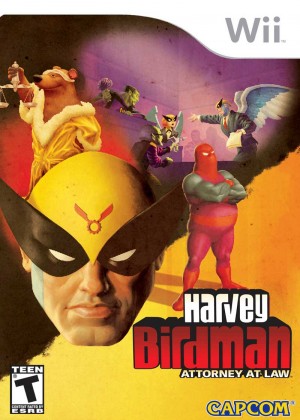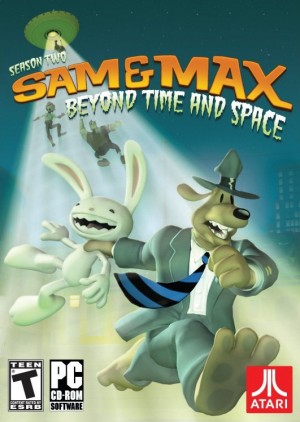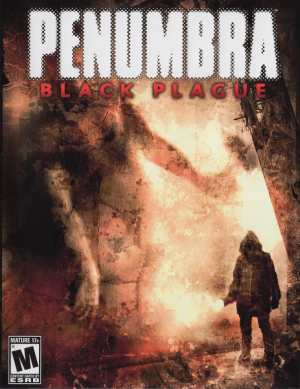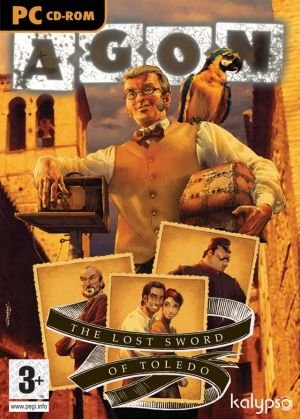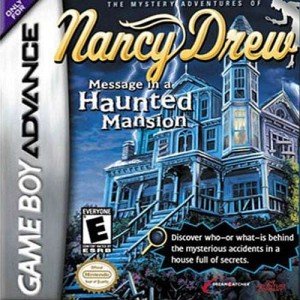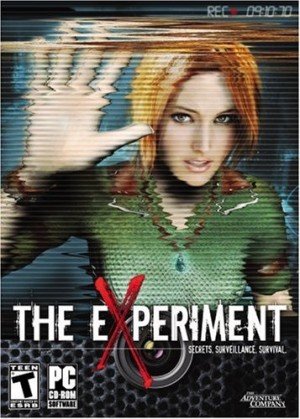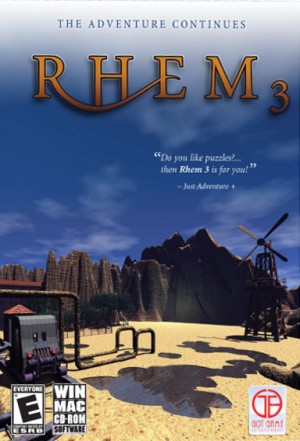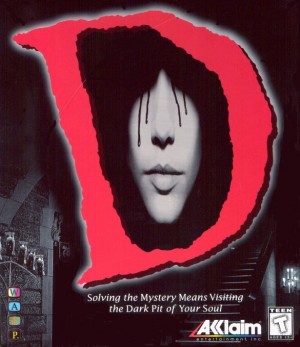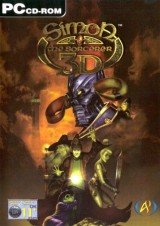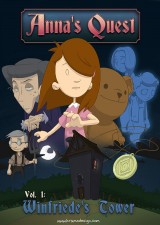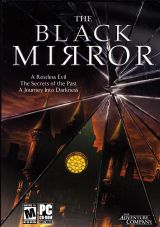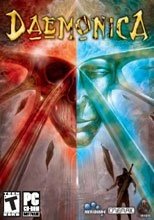Review for Dead Mountaineer’s Hotel
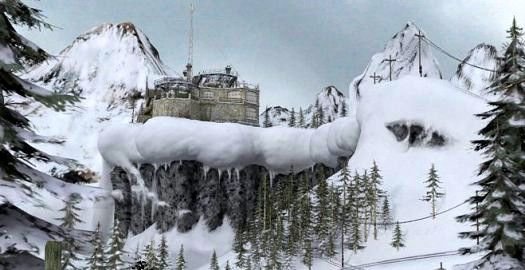
World-weary policeman Peter Glebski is on a rare vacation, and he's chosen to spend his two weeks of tranquility at the titular Dead Mountaineer's Hotel, a sprawling mansion perched atop a snowy peak in an Alpine valley named Bottle Neck. Named after the man who went skiing one fateful day, never to return, there have since been bizarre goings-on in the hotel – harmless pranks presumably played by the dear departed. And indeed, things turn weird right away when Peter is inexplicably locked in his room, setting up a brief but clever quest.
Unfortunately, thereafter it's a dizzy plunge downhill for about five hours as you keep waiting for a story to start that never does. Peter roams the many floors and hallways on a handful of silly errands, guests ramble on in a medley of abysmal voice acting, and disjointed events occur without prelude, consequence or reason. There's almost no explanation of objects and tasks, while clunky controls make exploration arduous and minigames a pain. The multi-storied hotel is beautiful but creepy, with meticulously detailed interiors and a breathtaking exterior. However, the abrupt ending, which clarifies the plot in one mindboggling sentence and forces a pointless decision on a topic introduced only seconds earlier, is a relief from the remarkably tiresome excursion.
Developed by Russian studio Akella, the game is based on the sci-fi novel of the same name written by renowned authors Arkady and Boris Strugatsky. The premise pits practical detective work against supernatural phenomena, but the game fails both at adapting the story into a riveting whodunit and designing quests relevant to the plot. It starts strong and stays aligned with the book in terms of the setting and the cast of characters, but the marquee event – a murder – doesn’t happen until shortly before the end, and until then Peter is occupied with onerous tasks like fixing the call button wiring, identifying – by visiting every room – which guest is unduly occupying the communal shower, playing billiards to impress a married woman, choosing his dinner from the buffet, and fetching bottle after bottle of whiskey for a wily drunk.
Events supposedly proceed in real time, with people going about their business independent of Peter's activities, but without any idea whatsoever of their agendas, it's unclear what's being missed, or even why (until the murder happens) we should care about what they're doing. The 'ghostly pranks' are childish – inexplicably muddy shoes, wet towels scattered about, displaced items – and fail to intrigue or scare. Besides, the owner and most of the guests enthusiastically accept the oddities, which further lowers the incentive to investigate them. There are apparently four possible endings, two of which result from Peter's decision following the final revelation; the third depends on a conversation choice made shortly after the murder, and the fourth is linked to an optional side quest that you may easily miss altogether.
While the attempt at a non-linear, multi-outcome format is laudable, the total absence of a mechanism to involve the player in the process makes it irrelevant. There's no indication during the game of the real-time concept, nor any hint (except in the last scene) that you're at a crucial juncture where your actions will make a difference to the outcome – which means there's no guarantee you'll encounter the alternate events even during a replay, provided you are inclined to invest the time and effort again after a harrowing first experience.
The hotel already has five guests by the time Peter arrives: illusionist du Barnstocre and his androgynous niece/nephew Bruen; flagrantly rich, mismatched couple Mozes and Olga, and snarky physicist Simone. Olaf, a strapping Norwegian; and shady, whiskey-swilling Hinkus are added to the fray the next day, and the motley crew is rounded off with the late arrival of a one-armed stranger. There is one staff member besides the owner Snevar: the hefty housekeeper Kaisa, whose simplicity yields some quirky chats. But no one, including Peter, is interesting or likeable. Snevar, an aficionado of fine wines, multicultural literature and perpetual motion machines, is cordial but superficial; genial du Barnstocre prefers to stay in his room and listen to Mozart; swarthy Mozes is a pompous bully who refers to himself in the third-person; and Olga is a vacuous porcelain beauty in a precarious strapless dress. Peter appears to be in his late thirties, and though generally cranky, he handles the case with the professional detachment of an experienced cop. He shares little personal opinion on any matter, and spends his spare time dreaming about 'radiant Olga' and propositioning her, often despite the presence – and protests – of her husband.
The action is contained entirely within the hotel other than a quick foray outside to park Peter's car, but this isn't a deficiency. Besides the ten guestrooms, there is a library, a kitchen-pantry-dining hall setup, a game room, a greenhouse, a terrace, a basement with a wine cellar, a garage and several lounges, plus utility areas like lockers and bathrooms. The problem is, about half of these locations exist only to bloat the play time, and there are many doors which stay locked throughout. Also, the spatial arrangement of each area forces you to cross several filler screens on each trip. It takes time to get familiar with the layout due to the constantly changing camera angles, which alter the viewing perspective from screen to screen. Though floor plans are available, they are unlabelled and don't mark Peter's location, which makes them useless; expecting a teleportation option to counter the copious backtracking is, naturally, unrealistic.
Tasks are similarly designed to stretch legwork to the maximum. Most involve traversing the entire hotel, from terrace to basement, occasionally accompanied by a guest. Screens can be transitioned by double-clicking exits, but only if there are no doors in the way. There's no elevator, so you spend ages watching Peter saunter up and down the three flights of stairs. And yet for all that travelling, there are very few quests, just ordinary tasks, almost none of which are related to the murder. Some objectives, like focusing sunlight with a mirror, involve precise mouse control, and while not tough, they may require multiple attempts due to sensitive mechanics. You can play optional minigames like blackjack, darts and skiing, though these are unnecessary diversions from an already-flimsy plot. Yet these pale in comparison to an utterly rudimentary 2D billiards competition that whisks you right back to the infancy of computer gaming. No minigame has instructions, and most inventory attempts don't generate any feedback, so you have to somehow guess what's needed or why a solution isn't working.
Navigation is easy: mousing the cursor over hotspots displays icons – walk, talk, look, take or use (the last two interchanged often); clicking performs the action. There's a slight but perceptible delay between mouse-click and onscreen response, however, which can cause you to miss hotspots if you click over too many places in quick succession. There aren't too many things to gather at least, and no pixel hunting is required. The inventory, accessed by right-clicking the screen, holds typical items like razors and wrenches, as well as more exotic fare such as a ladies' handgun and a shawl. There are no close-ups or details available for the objects, nor any inventory combination puzzles for variety. Half the collection of thirty-odd items languish unused in Peter's pockets till the end.
Peter has many conversations with his fellow guests, on subjects ranging from the weather to the possibility of extra-terrestrial life to salacious gossip, but the volume of prattle overwhelms the nuggets of important information. There are multiple dialogue options per round, and the choice can matter (albeit rarely) in initiating quests or changing the outcomes of events – though there's no way to tell if you're at such a stage. The English script is grammatically weak, and the onscreen text is peppered with spelling mistakes, even of names. Peter's brief observations about characters and events are noted in his diary, which is maintained chronologically. The diary always opens with the first note, and you have to repeatedly scroll all the way down to the latest entry (using a tiny scroller-button), which makes the diary the scariest element of the game.
Graphically, the realistic game world is a treat. Each room has its own style and personality defined by furniture, fixtures, lighting, carpeting, wallpaper and art choices. The guestrooms are comfortable but functional; in contrast, the massive library and luxurious lounges are adorned with expensive upholstery and objets d'art. The basement is cold and dingy, while Kaisa's kitchen is warmly welcoming, and on the open terrace you can almost feel the bite of the icy wind. From the first floor balcony, you can see a gold-embossed map of the valley inscribed across the reception floor; equally impressive in another room is a massive spinning globe. There are also a lot of peculiarly designed wrought iron fittings, like lamp holders and banisters, which gel well with the whimsical surroundings. The day and night differences for each area are also well done.
Ambient animation adds a subtle enhancement, be it the swirling snow outside, the fireplace in the lounge, or the slowly rotating ceiling fans (though it's odd to have fireplaces and fans on in the same weather). Authenticity is added via small touches like the car sinking slightly when Peter sits in it, people's breath fogging when outside, and reflections in mirrors and polished marble floors. The characters have some jagged edges but move quite believably when they walk – but if they run into an obstacle, they back up like cars, then move sideways and ahead again. They have a couple of arm gestures each, which they repeat constantly while talking; particularly distracting is the guests waving their food – speared on forks – in the air while chatting at the dinner table.
Sound effects are decent, and a steady background buzz is created by the ticking of clocks and Snevar's perpetual motion gadgets when indoors, and the rush of the wind when outside. The smooth change in the sound of Peter's footsteps depending on the surface he walks on – snow, stone, carpet or grating – is especially impressive. In contrast, the music is inconsistent: while the main piano-based score suits the mellow mood well, in certain areas like Simone's and Bruen's rooms, loud rock music disrupts your focus. The discord is multiplied as the music completely restarts from screen to screen when you walk from one part of the same room to another.
The voice acting is awful, despite a reasonable casting of types. Peter is unduly aggressive (he also sometimes says instructions meant for him aloud, like 'take it' or 'ring', as if they are dialogue); Snevar uses the same monotone for greetings and dead bodies; Mozes equates raving with asserting himself; and gender-bender Bruen, though voiced by a girl, sounds distinctly like a guy. But none are as irritating as the one-armed stranger, who grates with his dull, staccato speech. Vapid Olga and earthy Kaisa save the day somewhat, performing their short roles efficiently. Lip-syncing never matches any voiceover – which may be because the original dialogue was in Russian, or may simply be poor coordination; it's hard to tell.
There is little to applaud in this game besides its art and the attempt to create a non-linear flow via real-time event progression and multiple outcomes of in-game decisions, though the latter doesn't elevate the overall experience due to poor implementation. The quests are unimaginative, often irrelevant to the case, and some feel like outright punishment, like when you have to traverse the entire hotel four times to fetch two bottles of scotch. Minigames like blackjack and darts are useless in an adventure unless they have an explicit purpose or are fun diversions in their own right, which these ultra-ordinary versions are anything but. There's no focus on either procedural investigation or supernatural phenomena, and gameplay is tiresome due to erratic controls, awkward design, and insufficient or missing information. The attention to detail is appallingly shoddy as well, making the experience additionally unpleasant, which is a crying shame given the delay of almost four years for the English version release. No one bothered to proofread the text or tweak the translation in the meantime, let alone fix some of the bigger gameplay issues.
But the biggest letdown is the absence of a coherent plot, which is inexcusable for a game based on a full-fledged novel. The characters are reduced to caricatures, events are rarely linked to the story and many are left either as loopholes or summarily dismissed with silly excuses. There are no gradual revelations as Peter works the case, nor any sense of urgency or even purpose. The one-sentence reveal at the end – which blithely states a fact, assumes it's enough explanation, and forces you into an uninformed decision, is an insult to anyone who endures the hassles of the five-odd hours to reach that point. Dead Mountaineer's Hotel is almost a case study of what an adventure game shouldn't be, which is all the more unfortunate considering its immense potential.


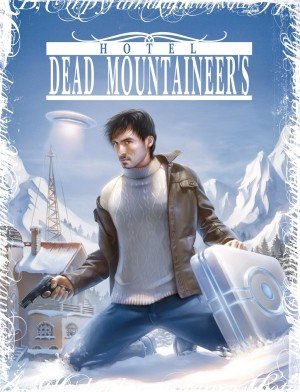
_capsule_fog__medium.png)






